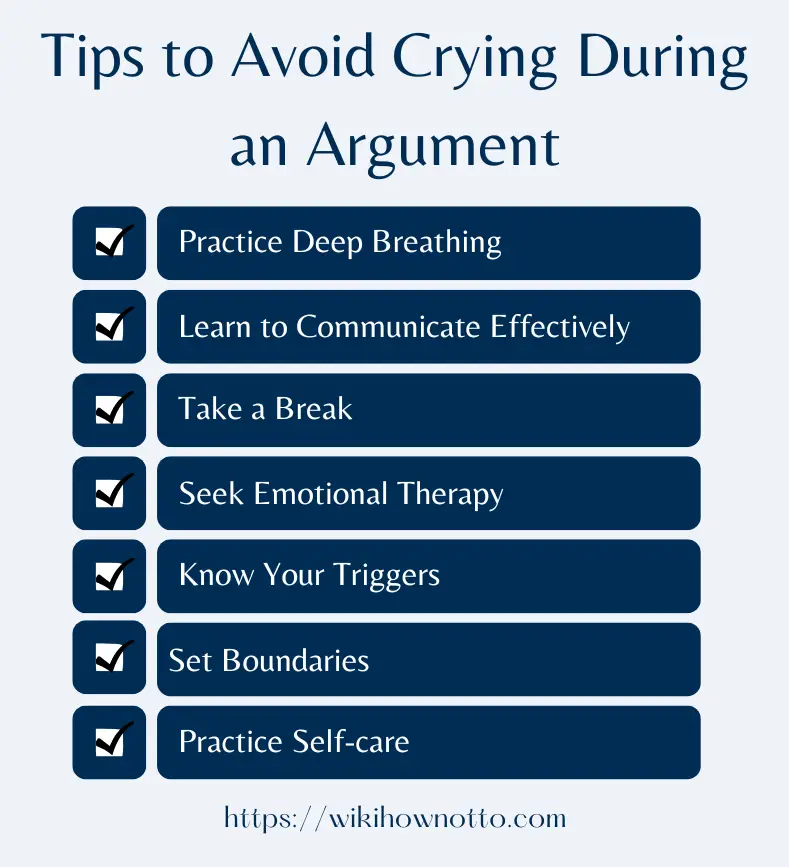How to Avoid Crying During Arguments

There is a popular quote that says, “Crying doesn’t mean you’re weak; it means that you have a heart.” While expressing your feelings is important and healthy, you can start to cry when arguing with your spouse, boyfriend, girlfriend, or parent. Crying is common when we feel intense emotions such as anger, frustration, and hurt. But why does this happen?
According to American Psychological Association (APA), women tend to cry more (30-64 times annually, compared to men (5-17) times. There are 3 types of tears:
- Basal (for lubrication),
- Reflex (which are triggered by irritants like dust, smoke, or onions)
- Emotional tears.
Emotional tears are caused by feelings of sadness, worry, stress, or anger, and this could be what you are experiencing. Let’s look at some reasons why you cry during an argument.
Why Do I Cry When I Argue?
If you want to know how not to cry while arguing, you must first understand what could be causing the tears. Or you could be asking, “why does my boyfriend cry when we argue?”

1. Emotional Triggers
Everyone has emotional triggers that, when activated, cause an intense reaction. This could be anything from a memory of past trauma to something as simple as feeling overwhelmed. Once the trigger is activated, you become so emotionally charged that tears may start flowing uncontrollably.
2. Fear of Rejection
Sometimes crying during an argument is a sign of fear. You may be scared that your point will not be heard, or worse, it could result in rejection from the other person. This fear can lead to feelings of insecurity which can cause you to feel helpless and vulnerable, making you cry when arguing.
3. Difficulty Expressing Yourself
Have you ever found expressing yourself during an argument challenging because your emotions are beyond words? This difficulty can lead to frustration, making it hard to stay composed, and the tears start rolling.
4. Past Traumas
Judith Lewis Herman says, “After a traumatic experience, the human system of self-preservation seems to go onto permanent alert, as if the danger might return at any moment.”
Sometimes, an argument can bring up memories of past traumas. Maybe it’s something you have been through or a reminder of something from childhood. Whatever it is, this can be an intense experience, and the only way to express this emotion may be through crying.
5. Lack of Assertiveness
Assertiveness is the ability to relay your ideas and opinions without feeling intimidated by others. The lack of assertiveness can make you feel overwhelmed and powerless. Consequently, you can start crying as you argue.
6. Hormones
When we become emotional, our bodies release prolactin and cortisol hormones. These hormones create the sensations we experience when we can’t handle a situation, triggering tears as a response.
Next, we will look at some tips to help control your emotions and avoid crying during an argument.
How to Not Cry During an Argument
Do you know you can learn how to control tears while arguing? Here are tips that will help you.

1. Practice Deep Breathing
Deep breathing is one of the most effective relaxation techniques. Exhaling and inhaling allow you to pause and take a moment to regain focus and composure, enabling you to continue the conversation without getting emotional.
Apart from this, deep breaths also help relax tense muscles and reduce the production of hormones associated with emotional responses.
2. Learn to Communicate Effectively
Effective communication is key to any successful relationship. Pay attention to body language, word choice, and tone when speaking so your point is more likely to be heard and accepted. If you practice effective communication skills, it will be easier for you to express yourself without getting too emotional.
3. Take a Break
If things become too heated during an argument, take a break. This will give you time to relax and collect your thoughts before resuming the conversation. You can use this time to practice deep breathing or go for a walk.
4. Seek Emotion-focused Therapy
Some reactions can be far-rooted and require the help of a professional. Emotion-focused therapy can help you identify and address underlying issues that may be causing your reaction. This will give you the skills you need to deal with arguments in a more controlled manner.
5. Know Your Triggers
Once you know your tear triggers during an argument, you can address them. You can get help from a therapist, talk to a friend, and be mindful of the situation. Apart from that, you should develop coping strategies for future arguments.
6. Set Boundaries
Setting boundaries involves understanding what topics are too sensitive or triggering to discuss and communicating with your partner. Establishing a no-shaming policy, where either party can call out any disrespectful behavior, can be a good start. Drawing the line at topics that can cause emotional distress will also come in handy.
7. Practice Self-care
You should prioritize your mental and physical well-being, especially when you feel overwhelmed. Self-care can involve getting enough sleep, eating healthy meals, and finding ways to relax.
Conclusion
Crying while arguing can be a challenging experience. If you understand your triggers and implement the tips above, you will find ways to manage your emotions during an argument. Learning how not to cry while arguing will help build healthier relationships.





